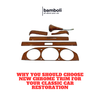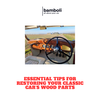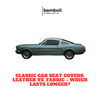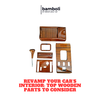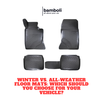Carbon Fiber vs. Aluminum Roof Racks: A Weight and Durability Comparison
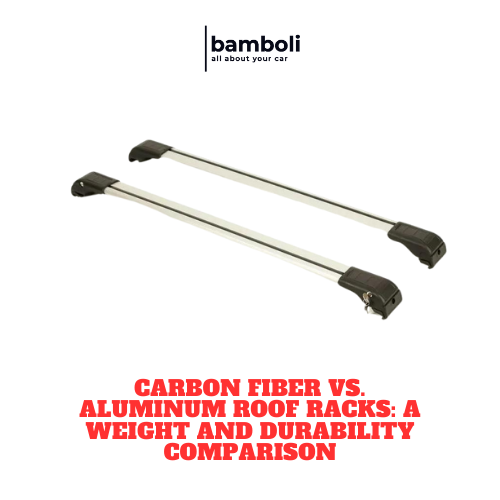
Carbon Fiber vs. Aluminum Roof Racks: A Weight and Durability Comparison
Roof racks are essential for anyone looking to maximize their vehicle's storage capacity. They provide the extra space needed to carry gear for road trips, outdoor adventures, and more. When selecting a roof rack, the material is a crucial factor to consider. Carbon fiber and aluminum are two popular choices, each offering unique benefits and drawbacks. In this comprehensive comparison, we’ll examine the weight and durability of both materials to help you make an informed decision.
Understanding the Materials
Carbon Fiber Roof Racks
Carbon fiber is a high-tech material known for its strength-to-weight ratio. It is widely used in industries such as aerospace, automotive, and sports equipment due to its exceptional properties.
Pros:
- Lightweight: Carbon fiber is significantly lighter than aluminum, making it easier to handle and reducing overall vehicle weight.
- High Strength: Despite its lightness, carbon fiber is incredibly strong and can support heavy loads without bending or breaking.
- Corrosion Resistant: Carbon fiber is resistant to corrosion, ensuring a longer lifespan even in harsh weather conditions.
- Aesthetic Appeal: Carbon fiber roof racks often have a sleek, modern look that enhances the appearance of your vehicle.
Cons:
- Cost: The advanced manufacturing process makes carbon fiber more expensive than aluminum.
- Fragility: While strong, carbon fiber can be brittle and prone to cracking under certain conditions, such as direct impacts.
Aluminum Roof Racks
Aluminum is a versatile and widely used material in various applications due to its excellent properties and affordability.
Pros:
- Durability: Aluminum is durable and can withstand heavy loads and rough handling without significant wear.
- Corrosion Resistant: Aluminum naturally forms a protective oxide layer, making it resistant to rust and corrosion.
- Cost-Effective: Aluminum is generally more affordable than carbon fiber, making it a popular choice for budget-conscious consumers.
- Flexibility: Aluminum roof racks can absorb impacts without breaking, making them less likely to crack under stress.
Cons:
- Weight: Aluminum is heavier than carbon fiber, which can add to the vehicle's overall weight and potentially affect fuel efficiency.
- Heat Conduction: Aluminum conducts heat more readily, which might not be ideal in extremely hot climates.
Detailed Comparison: Weight and Durability
Weight
|
Aspect |
Carbon Fiber Roof Racks |
Aluminum Roof Racks |
|
Weight |
Significantly lighter |
Heavier than carbon fiber |
|
Impact on Vehicle |
Reduces overall weight, enhancing fuel efficiency |
Increases overall weight, may affect fuel efficiency |
Carbon fiber roof racks are ideal for those who prioritize weight reduction and fuel efficiency. Their lighter weight makes them easier to install and handle, especially for solo travelers or frequent users.
Durability
|
Aspect |
Carbon Fiber Roof Racks |
Aluminum Roof Racks |
|
Strength |
High strength-to-weight ratio |
Strong but heavier |
|
Impact Resistance |
Can be brittle and crack under direct impact |
Flexible and absorbs impacts well |
|
Corrosion Resistance |
Excellent resistance to corrosion |
Naturally resistant to rust and corrosion |
Aluminum roof racks offer robust durability and impact resistance, making them suitable for rough terrains and heavy-duty use. Their ability to absorb impacts without cracking gives them an edge in rugged environments.
Real-World Use Cases
Scenario 1: Long-Distance Road Trips
For long-distance road trips where fuel efficiency and vehicle handling are critical, carbon fiber roof racks are an excellent choice. Their lightweight nature minimizes the impact on fuel consumption and makes loading and unloading easier.
Scenario 2: Off-Road Adventures
If your travels often take you off-road, aluminum roof racks are more suitable. Their durability and ability to withstand impacts ensure that your gear remains secure even in challenging conditions.
Pros and Cons Recap
Carbon Fiber Roof Racks
Pros:
- Lightweight
- High strength-to-weight ratio
- Corrosion resistant
- Sleek aesthetic appeal
Cons:
- Higher cost
- Potential brittleness under impact
Aluminum Roof Racks
Pros:
- Durable and impact-resistant
- Corrosion resistant
- More affordable
- Flexible and less prone to cracking
Cons:
- Heavier, affecting fuel efficiency
- Conducts heat more readily
Factors to Consider When Choosing Roof Racks
When deciding between carbon fiber and aluminum roof racks, consider the following factors:
Budget
Your budget will significantly influence your choice. Carbon fiber roof racks, while offering superior weight savings and aesthetics, come at a higher price point. Aluminum roof racks are more affordable and provide excellent durability for the cost.
Usage Frequency
Think about how often you’ll be using the roof rack. For frequent use, especially in varied weather conditions, the durability and cost-effectiveness of aluminum might be more appealing. For occasional use where weight and aesthetics are more critical, carbon fiber could be the better option.
Vehicle Type
Consider the type of vehicle you have and how the roof rack will impact its performance. Lightweight carbon fiber racks are ideal for smaller cars or sports vehicles where every ounce counts. Aluminum racks, with their robustness, are better suited for larger SUVs or trucks that require heavy-duty performance.
Installation and Maintenance
Proper installation and maintenance are key to maximizing the benefits of your roof rack, regardless of the material.
Installation Tips for Carbon Fiber Roof Racks:
- Ensure compatibility with your vehicle’s roof rails or mounting points.
- Handle with care to avoid cracks or damage.
- Follow manufacturer instructions closely to ensure a secure fit.
Installation Tips for Aluminum Roof Racks:
- Check for proper fitment with your vehicle model.
- Use appropriate tools to avoid over-tightening, which can damage the material.
- Regularly inspect for signs of wear and tear, especially after off-road use.
Maintenance Tips:
- For Carbon Fiber: Regularly clean with mild soap and water to remove dirt and debris. Inspect for any signs of cracks or damage, especially after impacts.
- For Aluminum: Clean with water and mild detergent to prevent buildup of grime and salt. Check for any signs of corrosion or dents, and address them promptly to maintain the rack's integrity.
Frequently Asked Questions
Which is better for aerodynamics, carbon fiber or aluminum roof racks? Carbon fiber roof racks, being lighter, generally offer better aerodynamics, which can help improve fuel efficiency.
Are there any weight limits for carbon fiber roof racks? Yes, while carbon fiber is strong, it has weight limits set by manufacturers. Always check the specifications to ensure you don’t exceed the recommended load.
Can aluminum roof racks rust? Aluminum does not rust like steel, but it can corrode. However, it forms a protective oxide layer that helps prevent significant corrosion.
Do I need professional installation for roof racks? While many roof racks can be installed by the user, professional installation ensures a secure fit and can prevent potential damage during the process.
Can I paint or customize my roof rack? Both carbon fiber and aluminum roof racks can be customized, but it’s essential to use the right products and techniques to avoid damaging the material.
Making the Right Choice
Choosing between carbon fiber and aluminum roof racks depends on your specific needs and preferences. Carbon fiber roof racks offer unmatched weight savings and a sleek appearance, making them ideal for those who prioritize performance and aesthetics. On the other hand, aluminum roof racks provide excellent durability and affordability, making them a practical choice for rugged use and budget-conscious consumers.
Consider your typical usage scenarios, budget, and vehicle type to make an informed decision. Both materials offer unique advantages that can enhance your vehicle’s functionality and style.
